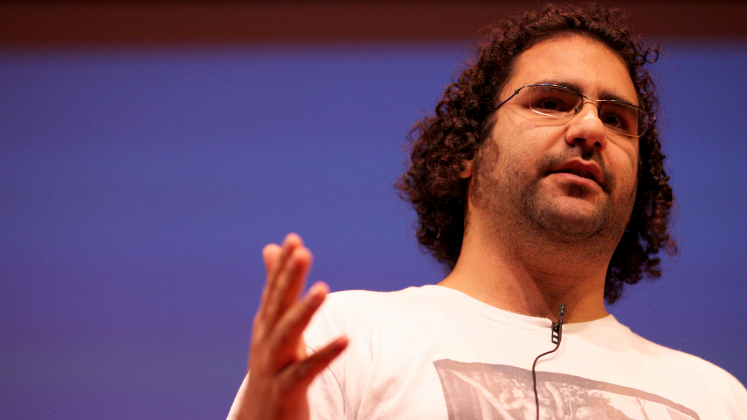 The United States today cries out for a robust, self–respecting, intellectually sophisticated left, yet the very idea of a left appears to have been discredited. In this recent book, Eli Zaretsky rethinks the idea by examining three key moments in American history: the Civil War, the New Deal and the range of New Left movements in the 1960s and after including the civil rights movement, the women′s movement and gay liberation. Emily Coolidge Toker recommends the book to anyone looking for a quick and convincing call to action.
The United States today cries out for a robust, self–respecting, intellectually sophisticated left, yet the very idea of a left appears to have been discredited. In this recent book, Eli Zaretsky rethinks the idea by examining three key moments in American history: the Civil War, the New Deal and the range of New Left movements in the 1960s and after including the civil rights movement, the women′s movement and gay liberation. Emily Coolidge Toker recommends the book to anyone looking for a quick and convincing call to action.
 Why America Needs A Left: A Historical Argument. Eli Zaretsky. Polity Press. April 2012.
Why America Needs A Left: A Historical Argument. Eli Zaretsky. Polity Press. April 2012.
Eli Zaretsky’s Why America Needs a Left sets out to prove that America does indeed have a left – and ultimately does so successfully. While the immediate context is that of the presidential election in the United States, Zaretsky also makes a point of extending his argument well beyond November’s election, opting instead to contribute a broadly invigorating treatment of the historical experience and theoretical promise of what he shows to be a long socio-political tradition of a left in American politics. Having such a history set out provides continuity, direction, and a tradition that I imagine Zaretsky hopes will prove stabilizing and heartening to the left of today.
Grammatically awkward though it may be in the previous paragraph, the choice of ‘a’ left is not arbitrary – in fact, throughout the book, Zaretsky is very careful to distinguish between republican and Republican, liberalism, Liberals, and various incarnations of the left. These are distinctions that fascinate from high school history classes onwards, when voters to be first see party platforms shifting a lot from one decade to the next. MSNBC TV host Rachel Maddow occasionally enjoys highlighting the fact that Republicans of the 1980s wouldn’t recognize their colleagues of 2012. Zaretsky, though, fits this admittedly great joke into a clear historical development over the course of the Civil War, the Progressive era of 1890-1920, and the rise of our kooky modern capitalism.
The left identified here is by no means a constant presence. Instead, Zaretsky sees it as a more or less organic fringe movement that, during a period of social and systemic crisis, imbues the debate with a moral grounding. Each “new left” results in the “construction of a new social order” (p. 57) regardless of what idealists might see as their limited success in shaping the outcome.
The first chapter discusses a left that was crucial to the abolitionist movement, insisting on a radical racial equality that went deeper than the more popularly accepted approach of simply doing away with the institution of slavery but not extending the rights of citizenship to freed slaves and their descendants. “The abolitionists,” Zaretsky writes, “created the model for subsequent American lefts by insisting on equality as the way to resolve a national crisis” (p. 19). The second left, which came into being in response to the Great Depression, builds on the principle of full racial equality espoused by the abolitionist left, imprinted “the ideal of social equality on the modern administrative state” (p. 58). According the Republican nominee it is to these efforts that we can date Americans’ “shameful sense of entitlement” to food, housing, healthcare, education, and equality before the law.
The third period Zaretsky examines in any detail is that of the push for participatory democracy in the 1960s and 1970s. To the left of this period, arrayed against the military Keynesianism of America in the new international order, he traces principles of resistance to the rise of “finance, consumerism, and marketization” (p. 101) that can still be seen vividly in the Occupy movement that has so far accompanied our current global recession.
Brought together by a focus on accessibility in the public sphere and uncompromisingly ideologically-motivated campaigns, incarnations of the left in America worked to determine the meaning of the changes brought about by revolution, providing a unified vision of what was, and is, at stake despite the increasing specialization of movements, especially with the rise of neoliberalism and the marketization of identity politics. Read as a manual for contemporary civilians, each episode offers important critiques of the left’s response to the crisis of the day – which absolutely ought to inform us going forward, as we stare in horror at the latest, greatest tsunami of a crisis racing towards our decidedly vulnerable shores.
Zaretsky, a professor of History at Eugene Lang since 1999, has written extensively on the history and theory of capitalism as a socio-cultural phenomenon and teaches courses on hegemony and empire, Marxism, and capitalism and charisma.
For those disenchanted citizens who have watched, open-mouthed, as America’s national politics have boon increasingly over-run with unabashed hypocrisy, this book will be a small current of fresh air showing the “influence an intransigent minority can exert on a relatively passive majority” (p. 47). Students not yet of voting age or merely bored to death with the disjointed “narrative” of history textbooks will be gratified to find the names and factions more meaningfully organized around the birth and development of a single, reasonably unified, idea: that equality and freedom are ongoing projects. Hopefully, this book will also be read as an impetus to serious political engagement and a return to participatory democracy in a post-Citizens United America – in fact, given the powerful punch line, I’d recommend that anyone looking for a quick call to action read the conclusion first, and save the historical underpinning for when hope gets a little scarce and it becomes more important to see the left in terms of its longevity and, to the extent that principles of radical equality are deeply embedded in American political history and cultural identity, the great success already achieved.
Listen to Eli Zaretsky in our podcast on the future of the Left
 Listen + Subscribe via iTunes
Listen + Subscribe via iTunes  Download MP3
Download MP3  Webfeed
Webfeed
[jwplayer file=”http://media.rawvoice.com/lse_lsereviewofbooksblog/richmedia.lse.ac.uk/lsereviewofbooksblog/20120719_LSERB_Podcast_3_MarxismAndTheLeft.mp3″]
——————————————————————————————-
Emily Coolidge Toker is a recent graduate of Sabanci University’s Cultural Studies program. She received her BA in Sociology from Bryn Mawr College in 2007 and has been living and teaching in Istanbul, Turkey, since. Her research focuses on translation theory, mimesis, the globalization and politics of English, and diaspora studies. Read more reviews by Emily.







